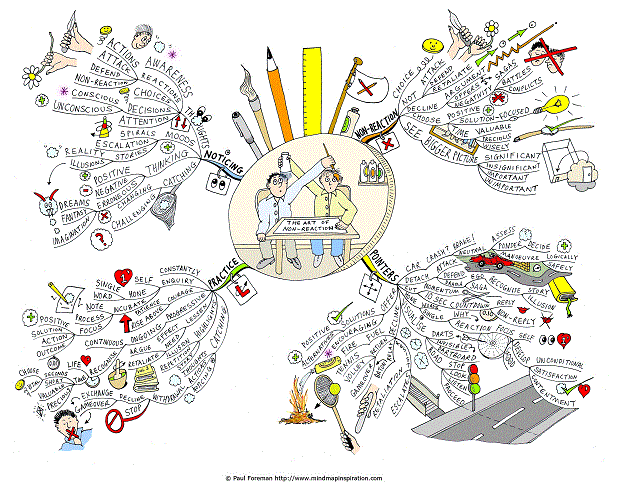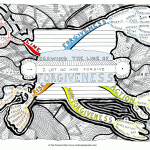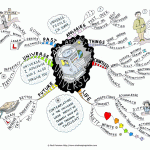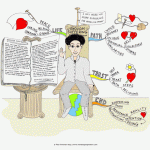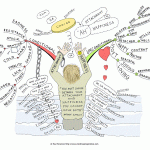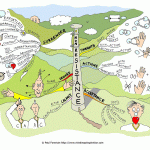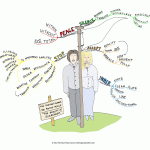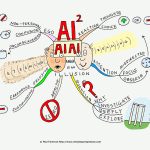Twenty seconds of thinking can ruin your day; only if you let it. The focus of attention is a choice yet the choice can get forgotten or overlooked and thought can escalate or spiral. A story builds and your mood can change; all from a thought.
Speed of recovery, speed of noticing and making a conscious choice away from erroneous or negative thinking is the crucial factor. Your thoughts are not necessarily your reality; the proof is your dreams, fantasy and imagination.
Attack and defend thoughts; non-peace thoughts are still only thoughts unless they make it into actions. The guardian is your consciousness; the warden of your thinking. Have your thoughts made it out of your mind into action, be it speech, written or physical action? If you can catch your thinking and notice your thoughts, you can change your thinking; change your thoughts and improve your day. It can happen in an instant or take hours and the deciding factor is awareness; the noticing.
The art of non-reaction is making conscious choice not to join an argument, or follow non-productive thinking. During the course of an “average” day you will no doubt get plenty of offers which you can practice declining, plenty of opportunities to become aware. When you choose not to join an argument or follow a negative thought your life improves for the better and you can focus on the positive. Life is too short to spend your precious time in a series of sagas and battles and fortunately through non-reaction you can make better choices.
When you consider the bigger picture most arguments are insignificant, unimportant, even if they seem incredibly important at the time. Does it really matter who chose the largest cake?
Arguments are like tennis matches – if you don’t return the ball the game stops.
Here are some pointers for practicing the art of non-reaction:
Recognise that other people’s reality is not your reality – their reality is their business.
Instead of adding fuel to the fire resist retaliation and cut the momentum before it escalates.
Instead of hitting the tennis ball back you choose not to return the volley – let it pass you; let the game stop.
Imagine that you are an invisible dartboard – visualise darts passing through you. The darts (attacks, insults, arguments etc) don’t land; you are invisible.
Pretend there is no one to get hurt because underneath the ego (illusion) there isn’t anyone to hurt. Beneath the labels we are all the same.
Insults that don’t land cannot spread or develop.
Try a ten second countdown instead of or before a reply.
Practice offering a positive alternative or encouraging solution based thinking.
Instead of crashing your car, you gently apply the brakes, stop, engage neutral and assess the situation. Ponder, then decide, then manoeuvre, logically and safely.
Detach from attack – detachment is choosing not to have a drama to defend.
Explore not feeling attacked despite attacks.
Recognise the ego is what is attacked or defended and the ego is an illusion, a story of who you think you are not who you really are. Insults and attacks are rarely personal and even if they are intended to be personal the offerer is attacking an illusion; their interpretation or story of you is what they insult or attack. Because attacks are aimed at the illusion they do not, cannot satisfy and so the game has to continue until it is realised to be an illusion and fruitless.
Passing the baton in a relay; don’t take it and the race stops.
Work on you not others – develop your unconditional satisfaction and contentment; focus on the good.
Are you patient or a “mug”? It’s not a question of not standing up for yourself it is about rising above.
It takes greater courage to resist confrontation; be courageous.
Transcending ego; once you rise above the process becomes easier – you develop an unwillingness to accept alteration of who you are and the positive focus you stand for. Progressively, attacks and insults have less effect on you. You don’t feel the need to retaliate or argue, because you see the repetition for what it is.
Practice catching your thinking, noticing your thoughts. Stepping back long enough, often only a split second, to self enquire before being drawn into an argument or retaliating.
Notice what happens when you decline an invitation to an argument – it cannot go anywhere without an exchange; game over.
Enquire who or what in you is reacting and why. What is your perception of why you feel it necessary to attack or defend? Stop and explore what, why and how you can rise above; how you can look again and see differently.
Life is too short to waste your precious and valuable time on negativity and reactions.
Non-reaction requires a moment by moment practice, awareness of thoughts and actions; the choices you make govern your moment by moment life experience.
Every coin has two sides and it is quite tricky seeing both at the same time.
Next time you sense yourself having a reaction, try honing in on one word that specifically describes the “why” of your reaction. This fast tracks you to acknowledge what in you is causing your reaction and very often instantly highlights a clear and obvious illusion. If you hone in on a word such as “anger” keep going and explore the why beneath it and stick to one word each time, to help uncover reasons for the anger rather than accepting or stopping at the single label of anger. Experiment also with honing in on single word positive actions which simplifies any self-enquiry; examples might be – ignore, acknowledge, accept, surrender, move. This helps you note and process rather than attacking, defending or reacting.
Ultimately the art of non-reaction is a 100% positive and solution orientated focus.
When you cross a road, you stop; look, listen and you check both ways before proceeding. The art of non-reaction is exactly the same.
Stop, look and listen to your thoughts and what is being said and you can rise above by choosing non-reaction.
It takes a second to have a reaction and a second to choose non-reaction; spend your seconds wisely, for they make the minutes, hours, days and years of your life.
The art of non-reaction is the positive way; the way of solutions and how you can change your life for the better.
More from Mind Map Inspiration:
Submit your review | |
It really helped me to notice my thoughts

